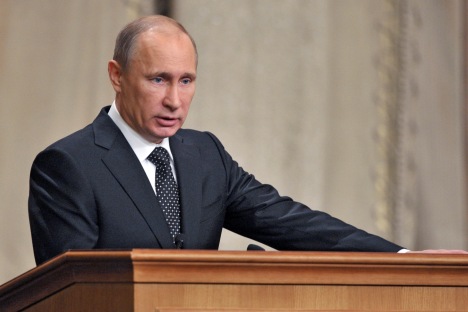By Amotz Asa-El,MarketWatch —
Vladimir Putin and Recep Erdogan are throwing punches like a pair of equally rated gladiators, but the commercial war that the one has sparked and the other is waging can be won only by one: Russia.
On the face of it, Moscow’s response to Turkey’s downing of a Russian bomber last week is economically mad. For a sanctioned economy to sanction an important trade partner that does not sanction it is as advisable as running naked in the snow is for a pneumonia patient.
The international sanctions that followed Russia’s annexation of Crimea last year, originally imposed by the U.S. and the European Union and then joined by Japan, Canada, Switzerland, Australia and Norway, have been debilitating.
Syrian President Bashar al-Assad has said that the Russian participation in the fight against ISIS has had a greater impact than that of the U.S.-led coalition.
The ban on extending long-term credit to state-owned banks crushed the ruble from 35 to 66.2 to the dollar, forcing the central bank to spend $90 billion last year, nearly a quarter of its overall reserves, in an effort to stem the currency’s collapse and the ensuing capital flight.
A few months later oil prices plunged, soon halving what Putin designed as his country’s main source of income and causing a recession that this new crisis can only make worse.
Moreover, the EU now also bans business with Russia’s arms industry, thus damaging Putin’s main industrial source of income, twice: First, with existing clients like Poland, which has a fleet of MiG-29s that needs spare parts, and then with potential new clients, like Iran and assorted African governments that Russia’s arms industry is eager to impress.
That is why the downing of the Su-24 is intolerable for Putin not only politically but also commercially. With the whole world watching a Russian-made warplane dropping from the sky in a fireball after being hit by a Western-made jet, Russia smells a marketing disaster.
The Su-24 is actually a heavy bomber not designed for a dogfight with the agile F-16 that downed it. Yet the people deciding about arms deals are often politicians whose familiarity with arms is limited, and for whom images like last week’s footage can be striking.
The damage to the prestige of Russian arms underscores the Kremlin’s broader reading of its situation with Turkey, which is that Erdogan has challenged Putin’s imperial quest. Putin’s conclusion from this is simple: Turkey must pay. That Turkey’s prospective payment entails hefty Russian costs is fine, provided that Turkey pays more, which it indeed will.
The Russian vow to punish the Turkish economy has yet to be fully detailed, but at stake is a $30 billion trade relationship that, while also important to Russia, is existential for Turkey.
Russia needs the roughly $4 billion worth of fruits and vegetables it has been buying in Turkey since the sanctions, but it will find such produce in other warm countries, just like it will find alternative clients for the $1.5 billion in grains that it sold Turkey last year.
Turkey’s tourist resorts are certainly not crucial for Moscow, even though 3.3 million Russians vacationed there last year. To the Turks, however, the Russian tourists are crucial because they comprise a full one tenth of annual tourist arrivals.
Russia’s economic disruptions are doubly harmful because Turkey, unlike Russia, is socially restive, due to the Kurdish problem and the Syrian civil war. Farmers whose harvests will lose the Russian market, and employees of the hotels and restaurants that will soon lose their Russian clientele, will join those Turks who already grapple with more than a million Syrian refugees’ pressure on the Turkish labor market.
Meanwhile, Russia will assist and incite Turkey’s rebellious Kurds while also loudly backing the Cypriots in their conflict with Turkey, not to mention the Armenians, who have historically been the latter’s proxy and the former’s foe.
Things can get altogether nasty if Russia stops its gas supplies, which dominate the two countries’ trade.
Yes, $20 billion is a lot of money even for Russia, but it’s not the kind of sum it can’t afford to lose. Turkey, on the other hand, if deprived of Russia’s gas, will nearly come to a standstill. Not only does Russia supply more than half of Turkey’s fuel, Erdogan is at loggerheads with the main alternative suppliers: Egypt, Saudi Arabia and the rest of the Gulf states, since he supported the Egyptian Muslim Brotherhood; Iran, since he demanded its proxy Bashar Assad’s removal; and Israel, since the Mavi Marmara incident in 2010.
Russia’s sanctions for now exclude gas supplies, and also the four nuclear reactors it agreed to build in Turkey for $20 billion and the TurkStream pipeline project that is meant to lead Russian gas to Turkey across the Black Sea. Still, judging by his past conduct Putin will not hesitate to close the spigot, the way he did repeatedly to Ukraine since 2005.
Moreover, when Europe responded to his Crimean adventure with sanctions, Putin not only failed to back down, he fired sanctions of his own, banning some $12 billion worth of annual food imports from the countries sanctioning Russia.
In other words, when faced with a choice between national honor and financial loss, Putin chooses honor.
Turkey has therefore all the reason in the world to fear that Russia’s economic pressure has hardly begun, and will not abate until someone in Ankara does what neither Putin nor Erdogan has ever done: surrender.









